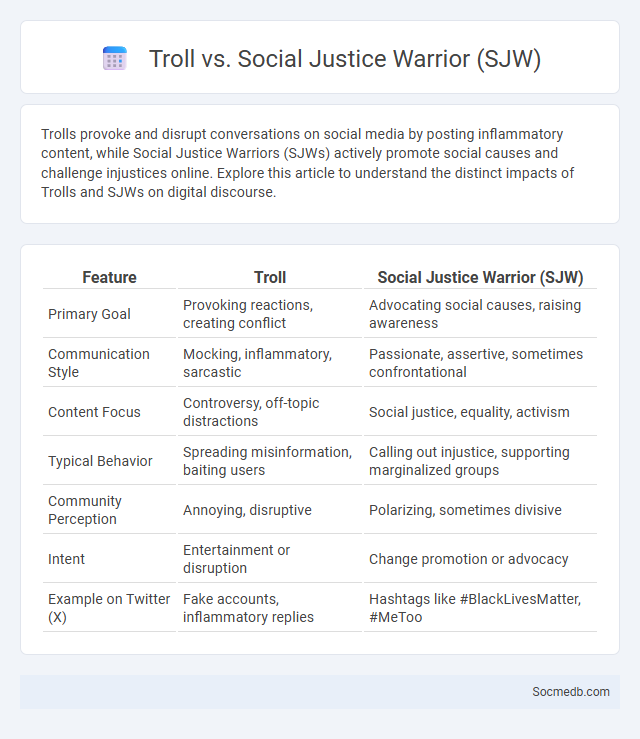
Photo illustration: Troll vs Social Justice Warrior (SJW)
Trolls provoke and disrupt conversations on social media by posting inflammatory content, while Social Justice Warriors (SJWs) actively promote social causes and challenge injustices online. Explore this article to understand the distinct impacts of Trolls and SJWs on digital discourse.
Table of Comparison
| Feature | Troll | Social Justice Warrior (SJW) |
|---|---|---|
| Primary Goal | Provoking reactions, creating conflict | Advocating social causes, raising awareness |
| Communication Style | Mocking, inflammatory, sarcastic | Passionate, assertive, sometimes confrontational |
| Content Focus | Controversy, off-topic distractions | Social justice, equality, activism |
| Typical Behavior | Spreading misinformation, baiting users | Calling out injustice, supporting marginalized groups |
| Community Perception | Annoying, disruptive | Polarizing, sometimes divisive |
| Intent | Entertainment or disruption | Change promotion or advocacy |
| Example on Twitter (X) | Fake accounts, inflammatory replies | Hashtags like #BlackLivesMatter, #MeToo |
Defining Trolls: Origins and Online Behavior
Trolls are individuals who deliberately provoke, disrupt, or manipulate conversations on social media platforms to elicit strong emotional responses or create conflict. Originating from early internet forums and chat rooms, trolling behavior has evolved with the expansion of social networks like Twitter, Facebook, and Instagram. Your awareness of troll tactics helps maintain positive online interactions and prevents the spread of misinformation.
What is a Social Justice Warrior (SJW)?
A Social Justice Warrior (SJW) is an individual who actively advocates for social justice issues such as equality, human rights, and anti-discrimination. SJWs often use social media platforms to raise awareness, challenge injustices, and promote progressive values. The term is sometimes used pejoratively to describe people perceived as overly aggressive or performative in their activism.
Troll vs SJW: Contrasting Motivations
Trolls often seek to provoke chaos and elicit emotional reactions by spreading misinformation or controversial content, prioritizing disruption over meaningful discourse. Social Justice Warriors (SJWs) aim to promote equity and advocate for marginalized groups, focusing on raising awareness and challenging social injustices. The contrasting motivations highlight trolls as agents of conflict, while SJWs emphasize advocacy and reform within social media ecosystems.
Impact of Trolls on Online Communities
Trolls disrupt online communities by spreading misinformation, inciting conflicts, and creating hostile environments that discourage genuine user engagement. The presence of trolls often leads to decreased participation, lowered community trust, and increased moderation costs for platform administrators. Research indicates that effective troll mitigation strategies, such as AI-driven content filtering and community-led moderation, significantly enhance user experience and promote healthier digital interactions.
How SJWs Influence Internet Discourse
Social justice warriors (SJWs) shape internet discourse by actively promoting social equality, diversity, and inclusion, often challenging traditional narratives and calling out discriminatory behavior. Their presence encourages more socially conscious conversations, but can also provoke polarization due to differing perspectives on activism. Understanding how SJWs influence online debates can help you navigate and contribute to digital platforms with greater awareness and sensitivity.
Common Tactics: Trolls and SJWs Compared
Trolls often exploit social media by posting inflammatory content to provoke emotional reactions and disrupt conversations, while SJWs (Social Justice Warriors) focus on advocating for social justice issues and calling out perceived injustices or offensive behavior. Troll tactics include using sarcasm, misinformation, and targeted harassment, contrasting with SJWs' methods of activism through hashtag campaigns, public shaming, and mobilizing online communities. Both groups significantly influence social media discourse, shaping online dynamics through confrontation and ideological expression.
Clashes and Controversies: Notable Troll vs SJW Incidents
Social media platforms have witnessed numerous clashes between trolls and social justice warriors (SJWs), often sparking viral controversies that highlight deep cultural and political divides. Incidents such as the Gamergate controversy and debates over cancel culture exemplify how trolling can provoke intense backlash from SJWs seeking social justice and accountability. These conflicts frequently escalate into widespread online campaigns, influencing public discourse and platform moderation policies.
Psychological Profiles: What Drives Trolls and SJWs?
Psychological profiles of social media users reveal that trolls often exhibit traits like sadism, narcissism, and a desire for attention or control, fueling disruptive and provocative behavior. Social Justice Warriors (SJWs), on the other hand, are frequently motivated by strong moral convictions, a high need for social justice, and empathy towards marginalized groups, leading to passionate online activism. Understanding these underlying psychological drivers can help in developing more effective strategies for managing online interactions and reducing conflict.
Community Moderation: Dealing with Trolls and SJWs
Effective community moderation involves identifying and managing disruptive behaviors from trolls and overly zealous SJWs to maintain a respectful environment. Implementing clear guidelines and leveraging automated tools helps filter out inflammatory content while promoting constructive dialogue. Your engagement is crucial for fostering a balanced community where diverse opinions can thrive without toxicity.
Beyond Labels: Fostering Healthy Digital Dialogue
Beyond Labels emphasizes creating respectful and inclusive social media environments that encourage genuine conversations free from stereotypes. This approach prioritizes empathy and active listening to bridge divides, fostering community trust and mutual understanding. Encouraging thoughtful engagement on platforms like Twitter, Instagram, and Facebook enhances digital wellbeing and promotes constructive dialogue.
 socmedb.com
socmedb.com